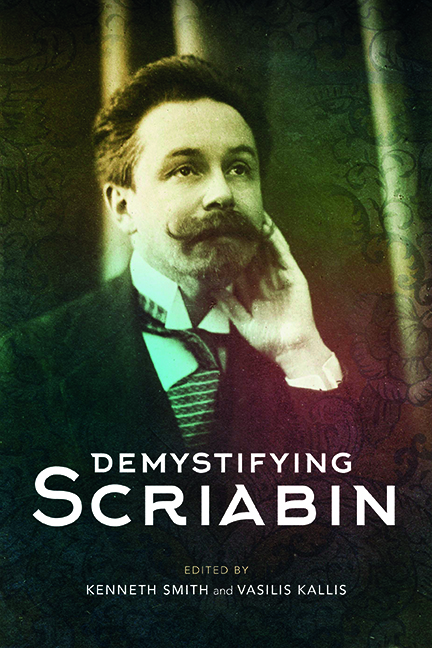15 - Scriabin and the Classical Tradition
Published online by Cambridge University Press: 07 October 2022
Summary
Scriabin is perceived in the West as a prominentRussian innovator. He is often compared to SergeĭRakhmaninov, who is treated as an utterconservative. In this sense, Scriabin is oftenlumped with the new music proponents, although hiscontributions are deemed not to reach the level ofSchoenberg's major tonal overhaul. Something inScriabin's oeuvre, both early and late, bothers theenthusiasts of the new music: there is an annoying imperfection. It isprecisely Scriabin's relationship with the Russianand European traditions of the past. Suchperceptions of Scriabin's music are ubiquitous inthe West; they are rather common in Russia as well.This chapter offers possible explanations of thisannoying imperfection – perhaps, leading to thelarger picture of the line of inheritance as a validartistic idea.
Scriabin the Revolutionary?
When Scriabin studied at the Moscow Conservatoire, histeacher in composition Sergeĭ Taneev playedtug-of-war with him. The evidence of an antagonisticrelationship is abundant; Leonid Sabaneev, forexample, provides the following characterization inhis Reminiscences ofScriabin:
Ascetic and somewhat purist, Taneev distancedhimself from Scriabin; the latter, apparently, didnot try to break the ice either. Scriabin –already a progressive, in spirit, if not yet indeeds – did not share Taneev's position as ‘akeeper of the tradition of Bach’.
There is historical evidence of quite acerbic remarksthat Taneev made about Scriabin's music, withouthesitation, publicly. In the circles of pianists,Scriabin's teachers and colleagues, the story wassimilar:
As far as I remember, Nikolaĭ Zverev nevermentioned Scriabin, or at least, did not sayanything special about him. Was it an accident, ordid Scriabin not shine on the background of otherconservatoire stars, I do not know.
Sabaneev adds to that his own impressions of the time:‘Even if Scriabin's specific way of playing wasalready shown, it was not noticed; we knew him onlyas a ‘pianist’; his compositions were completelyunknown.’ This pessimistic picture is revealing.Zverev never mentioned his name, although Scriabinstudied and lived in the home of his piano teacher.This looks like a perfect picture of a pioneer ofnew music fighting with living fossils –backwards-looking and ossified conservatoiredwellers.
- Type
- Chapter
- Information
- Demystifying Scriabin , pp. 282 - 301Publisher: Boydell & BrewerPrint publication year: 2022



